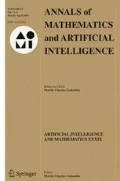Abstract
Partial equilibrium logic (PEL) is a new nonmonotonic reasoning formalism closely aligned with logic programming under well-founded and partial stable model semantics. In particular it provides a logical foundation for these semantics as well as an extension of the basic syntax of logic programs. In this paper we describe PEL, study some of its logical properties and examine its behaviour on disjunctive and nested logic programs. In addition we consider computational features of PEL and study different approaches to its computation.
Similar content being viewed by others
References
Brass, S., Dix, J.: A disjunctive semantics based on unfolding and bottom-up evaluation. In: Proceedings of IFIP 1994 Congress, Workshop FG2: Disjunctive Logic Programming and Disjunctive Databases, pp. 83–91. Springer (1994)
Brass, S., Dix, J.: Characterizations of the disjunctive stable semantics by partial evaluation. J. Log. Program. 30, 207–228 (1997)
Brass, S., Dix, J.: Characterizations of the disjunctive well-founded semantics: confluent calculi and iterated GCWA. J. Autom. Reason. 20, 143–165 (1998)
Brass, S., Dix, J.: Semantics of (Disjunctive) logic programs based on partial evaluation. J. Log. Program. 40, 1–46 (1999)
Brass, S., Dix, J., Niemelä, I., Przymusinski, T.: On the equivalence of the static and disjunctive well-founded semantics and its computation. Theor. Comp. Sci. 258(1–2), 523–553 (2001)
Cabalar, P., Odintsov, S., Pearce, D.: Logical foundations of well-founded semantics. In: Proceedings of KR 2006, pp. 25–35. AAAI Press (2006)
Cabalar, P., Odintsov, S., Pearce, D., Valverde, A.: Analysing and extending well-founded and partial stable semantics using partial equilibrium logic. In: Etalle, S., Truszczynski, M. (eds.) Proceedings of ICLP 2006, LNCS 4079, pp. 346–360. Springer (2006)
Cabalar, P., Odintsov, S., Pearce, D.: Strong negation in well-founded and partial stable semantics for logic programs. In: Simão Sichman, J., Coelho, H., Oliveira Rezende, S. (eds.) Proceedings of IBERAMIA-SBIA 2006, LNCS 4140, pp. 592–601. Springer (2006)
Dix, J.: A classification-theory of semantics of normal logic programs: I. strong properties. Fundam. Inform. 22(3), 227–255 (1995)
Dix, J.: A classification-theory of semantics of normal logic programs: II. weak properties. Fundam. Inform. 22(3), 257–288 (1995)
Eiter, T., Fink, M., Tompits, H., Woltran, S.: Simplifying logic programs under uniform and strong equivalence. In: Lifschitz, V., Niemelä, I. (eds.) Proceedings of LPNMR 2004, LNAI 2923, pp. 87–99. Springer (2004)
Eiter, T., Leone, N., Saccà, D.: On the partial semantics for disjunctive deductive databases. Ann. Math. Artif. Intell. 17, 59–96 (1997)
Eiter, T., Leone, N., Saccà, D.: Expressive power and complexity of partial models for disjunctive deductive databases. Theor. Comp. Sci. 206, 181–218 (1998)
Erdogan, S.T., Lifschitz, V.: Definitions in answer set programming. In: Lifschitz, V., Niemelä, I. (eds.) Proceedings of ICLP 04, LNAI 2923, pp. 114–126. Springer (2004)
Hähnle, R.: Automated Deduction in Multiple-valued Logics. Volume 10 of International Series of Monographs on Computer Science. Oxford University Press (1994)
Janhunen, T., Niemelä, I., Seipel, D., Simons, P., You, J.-H.: Unfolding partiality and disjunctions in stable model semantics. ACM Trans. Comput. Log. 7(1), 1–37 (2006)
Kraus, S., Lehmann, D., Magidor, M.: Nonmonotonic reasoning, preferential models and cumulative logics. Artif. Intell. 44, 167–207 (1990)
Lifschitz, V., Turner, H.: Splitting a logic program. In: van Hentenryck, P. (ed.) Proceedings of ICLP 1994, pp. 23–37. MIT Press (1994)
Lifschitz, V., Pearce, D., Valverde, A.: Strongly equivalent logic programs. ACM Trans. Comput. Log. 2(4), 526–541 (2001)
Lifschitz, V., Tang, L.R., Turner, H.: Nested expressions in logic programs. Ann. Math. Artif. Intell. 25(3–4), 369–389 (1999)
Makinson, D.: General theory of cumulative inference. In: Reinfrank, M., et al. (eds.) Non-Monotonic Reasoning, LNAI 346, pp. 1–18. Springer (1989)
Makinson, D.: General patterns in nonmonotonic reasoning. In: Gabbay, D., Hogger, C.J., Robinson, J.A. (eds.) Handbook of Logic in Artificial Intelligence. Clarendon Press (1994)
Osorio, M., Navarro, J., Arrazola, J.: Equivalence in answer set programming. In: Pettorossi, A. (ed.) Proceedings of LOPSTR 2001, LNCS 2372, pp. 57–75. Springer (2001)
Pearce, D.: Equilibrium logic. Ann. Math. Artif. Intell. 47, 3–41 (2006)
Pearce, D., de Guzmán, I.P., Valverde, A.: A tableau calculus for equilibrium entailment. In: Dyckhoff, R. (ed.) Proceedings of TABLEAUX 2000, LNAI 1847, pp. 352–367. Springer (2000)
Pearce, D., de Guzmán, I.P., Valverde, A.: Computing equilibrium models using signed formulas. In: Proceedings of CL2000, LNCS 1861, pp. 688–703. Springer (2000)
Pearce, D., Valverde, A.: Uniform equivalence for equilibrium logic and logic programs. In: Lifschitz, V., Niemelä, I. (eds.) Proceedings of LPNMR 2004, LNAI 2923, pp. 194–206. Springer (2004)
Pereira, L.M., Alferes, J.J.: Well founded semantics for logic programs with explicit negation. In: Neumann, B. (ed.) European Conference on Artificial Intelligence, pp. 102–106. John Wiley and Sons (1992)
Przymusinski, T.: Stable semantics for disjunctive programs. New Gener. Comput. 9, 401–424 (1991)
Przymusinski, T.: Well-founded and stationary models of logic programs. Ann. Math. Artif. Intell. 12, 141–187 (1994)
Routley, R., Routley, V.: The semantics of first degree entailment. Noûs 6, 335–359 (1972)
Ruiz, C., Minker, J.: Computing stable and partial stable models of extended disjunctive logic programs. In: Nonmonotonic Extensions of Logic Programming, LNCS 927, pp. 205–229. Springer (1995)
Seipel, D., Minker, J., Ruiz, C.: A characterization of the partial stable models for disjunctive deductive databases. In: Int. Logic Programming Symp., pp. 245–259. MIT Press (1997)
Vakarelov, D.: Notes on constructive logic with strong negation. Stud. Log. 36, 89–107 (1977)
van Gelder, A., Ross, K.A., Schlipf, J.S.: Unfounded sets and well-founded semantics for general logic programs. J. ACM 38(3), 620–650 (1991)
Wang, K., Zhou, L.: Comparisons and computation of well-founded semantics for disjunctive logic programs. ACM Trans. Comput. Log. 6(2), 295–327 (2005)
Author information
Authors and Affiliations
Corresponding author
Additional information
Partially supported by MEC projects TIC-2003-9001-C02 and TIN2006-15455-CO3.
Rights and permissions
About this article
Cite this article
Cabalar, P., Odintsov, S., Pearce, D. et al. Partial equilibrium logic. Ann Math Artif Intell 50, 305–331 (2007). https://doi.org/10.1007/s10472-007-9075-0
Published:
Issue Date:
DOI: https://doi.org/10.1007/s10472-007-9075-0




